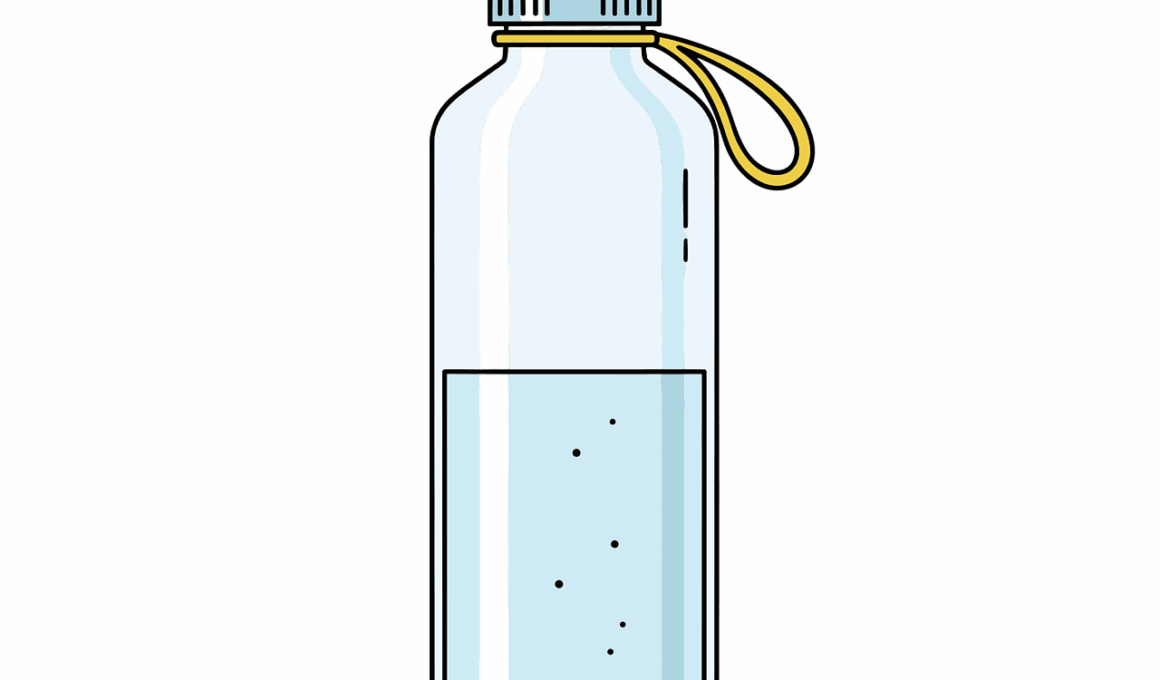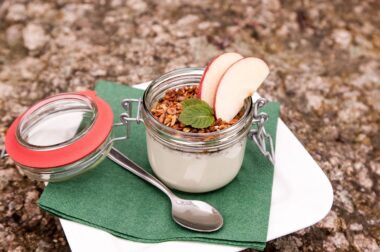Myth: Drinking Water Before Workout Causes Cramps
Many fitness enthusiasts often believe that drinking water before a workout can lead to cramps, making them hesitant to hydrate adequately. This myth has circulated for years, causing confusion about the actual role of hydration in exercise performance. The human body is mainly composed of water, emphasizing the importance of hydration for optimal physical function. Water assists in various bodily processes, such as temperature regulation, joint lubrication, and nutrient transport. When you exercise, your body loses fluids through sweat, making it crucial to replenish these lost fluids for peak performance levels. Insufficient hydration can lead to muscle fatigue and even cramps, which are caused by electrolyte imbalances, not simply the act of drinking water. Furthermore, properly hydrating before exercise can help enhance endurance and overall workout quality. Therefore, consuming water before exercising is vital and shouldn’t be avoided due to the myth surrounding cramps. Hydration not only supports physical activity but promotes better recovery post-workout as well. Staying hydrated should be a priority for anyone serious about their fitness routine, and understanding this concept is essential for maximizing workout results.
To put this myth to rest, let’s explore the science behind hydration and muscle function. Cramps often occur due to muscle fatigue and electrolyte imbalances, particularly low sodium, potassium, and calcium levels. When individuals do not hydrate properly, the risk of experiencing cramps increases significantly. Drinking water before exercise helps maintain electrolyte balance and provides necessary fluids to the muscles. In addition to drinking water, consuming foods rich in electrolytes can support hydration further. Sodium plays a key role in muscle contraction, while potassium helps muscles relax. For active individuals, including sources such as bananas, oranges, and electrolyte-rich drinks before exercise may enhance performance and reduce cramping. It’s crucial to listen to your body; if you’re feeling thirsty, it’s a signal to drink. Thirst is an early indicator of dehydration, and failing to heed it can lead to decreased performance and increased cramping risks. In conclusion, ensuring adequate hydration before workouts is beneficial rather than detrimental, and understanding proper pre-workout nutrition is vital for maximizing fitness endeavors.
The Importance of Hydration
Hydration is the cornerstone of effective pre-workout nutrition. The notion that drinking water induces cramping stems from misunderstandings about muscle physiology and hydration requirements. Keeping hydrated aids in maintaining proper blood circulation, which in turn ensures that your muscles receive sufficient oxygen and nutrients. This efficient delivery system helps in sustaining energy levels throughout your workout. If you’re exercising in hot conditions, the need for hydration becomes even more critical as the body dehydrates more rapidly. Additionally, dehydration can lead to reduced strength and increased fatigue, making your workout ineffective. Contrary to the myth, one should aim to hydrate well before and during workouts, as this practice enhances physical performance. Athletes often plan their hydration strategies meticulously, often incorporating a combination of water and electrolyte beverages, especially in endurance sports. As you prepare for exercise, consider your hydration status seriously, and adjust your fluid intake according to your activity level and environment. By prioritizing hydration, you can effectively combat the misconception regarding water intake before exercise and promote a healthier, more successful workout experience.
When discussing pre-workout hydration, it’s essential to note the role of individual differences. Some people may have a greater tolerance for fluid intake than others, while factors such as body size, workout intensity, and environmental conditions come into play. While some may drink a full bottle of water before workouts, others may prefer smaller, more frequent sips. Understanding your hydrating needs can help you tailor your approach to fit your body’s requirements. An awareness of one’s own performance with varying levels of hydration can also prove beneficial in cementing hydration habits. Additionally, hydration should not only be limited to water but can include fluids from various sources, such as milk, smoothies, or electrolyte drinks. Eating water-rich fruits and vegetables can provide hydration, making them excellent pre-workout snacks. Remember that when your body has the right amount of fluids, you’ll likely perform better, suffer fewer cramps, and recover faster post-exercise. This comprehensive approach to understanding hydration can debunk myths surrounding water intake and support achieving fitness goals efficiently.
Best Practices for Hydration
To optimize hydration strategies before workouts, it’s essential to follow some best practices that cater to individual needs and circumstances. First, aim to drink water consistently throughout the day instead of cramming your fluid intake right before exercising. Implementing a hydration schedule tailored to your workout times can significantly help maintain optimal hydration levels. Second, assess your body’s response to different hydration strategies by experimenting with various types of fluids and electrolyte supplements. Some individuals may benefit from water alone, while others may find electrolyte drinks better suited for their pre-workout routine. Third, consider the duration and intensity of your workout; longer and more intense sessions may necessitate increased hydration. Monitoring weight loss during exercise can also give a clue about required fluid replacement. Lastly, don’t forget to drink water post-workout to aid recovery, repair muscle tissues, and restore fluid balance. By focusing on these hydration principles, athletes and fitness enthusiasts can demolish myths about drinking water before workouts and improve overall performance.
In summary, the myth that drinking water before a workout causes cramps is a misconception that overlooks the crucial benefits of proper hydration. Understanding the sources of muscle cramps, which are primarily rooted in fatigue and electrolyte imbalances, allows individuals to debunk this widely held belief. Hydration should be seen as an essential component of workout preparation, contributing positively to performance outcomes. For those engaged in physical activities of any kind, the myths surrounding hydration must be corrected to foster better habits. As athletes and recreational participants, it is detrimental to overlook hydration requirements in pursuing fitness objectives. Building a well-informed understanding of pre-workout hydration not only quells the fear of cramps but also enhances the overall exercise experience. Staying hydrated is pivotal for maintaining energy levels, optimizing recovery, and ensuring effective workouts. In conclusion, embrace the importance of hydration and take proactive steps to prioritize drinking water before, during, and after workouts. This approach will ultimately lead to better athletic performance and encourage a healthier lifestyle overall.
The Way Forward: Combatting Myths
The fight against pre-workout myths begins with spreading awareness and education. As fitness enthusiasts, sharing knowledge about the critical role hydration plays is essential to dispelling misconceptions surrounding water intake and cramps. Engage in discussions in fitness communities, whether online or in person, to promote informed hydration strategies with peers. Highlighting research-based facts can inspire others to rethink their pre-exercise routines and emphasize how essential proper hydration is. By fostering a culture of education and support, athletes can encourage better hydration habits and promote a greater understanding of workout nutrition. Social media and fitness forums can serve as excellent platforms to share personal experiences with hydration and its proven benefits during workouts. Moreover, encouraging individuals to consult with nutritionists or fitness professionals can also lead to more comprehensive knowledge regarding pre-workout nutrition. This community-driven approach to combatting myths regarding hydration and exercise can contribute significantly to improving overall fitness outcomes. As a collective effort, discussing hydration can dismantle unfounded beliefs and ensure that people adequately prepare for their physical activities.
The myth surrounding drinking water before workouts causing cramps is clearly unfounded and requires urgent attention from anyone passionate about fitness. Emphasizing the importance of proper hydration is essential for both recreational enthusiasts and professional athletes. Research supports that hydration aids in performance and reduces the chance of cramps during exercise. Therefore, focusing on education, raising awareness, and sharing validated information is vital for transforming hydration habits. Individuals should understand that maintaining a proper hydration routine is fundamental to achieving any fitness-related goal. Continuing to passively accept misleading beliefs only serves to undermine progress and potential outcomes in athletic performance. Now is the time to take a stand and educate ourselves and others about real hydration practices. Ultimately, eliminating these myths lays the groundwork for more effective workouts and leads to healthier fitness communities. By remaining well-informed and proactive, we can influence our hydration habits positively and set the stage for successful workout routines. In doing so, we create an environment that promotes clarity, performance, and better overall health for everyone involved in fitness and exercise.





